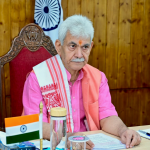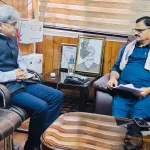Pulwama, Sep 22: Authorities of Shar e Kashmir University of Agricultural Sciences and Technology Kashmir (SKUAST-K) on Friday distributed free of cost corms to farmers for encouraging saffron cultivation in non-traditional areas.
The corms were distributed among progressive farmers here at Saffron Research Station Dusso in Pompore area of South Kashmir’s Pulwama district.
Around 12 quintals of corms were given to farmers from Bandipora, Shopian, Ganderbal, Kupwara, Budgam and Kulgam.
Vice Chancellor, SKUAST, Nazir Ahmad Ganaie, said they desire to see how they can extend saffron to other regions like Bandipora, Shopian, Ganderbal, Kupwara, Budgam, and Kulgam which have similar climate.
He said that last year they distributed saffron seeds to several progressive farmers in these areas and this year they repeated it involving more farmers.
“We distributed approximately 12 quintals of saffron seeds worth rupees 14 lakh, the farmers were also given inputs on indoor saffron cultivation,” he said, adding that the university has taken a pioneering step in indoor cultivation, making it possible to cultivate saffron under controlled environment.
The farmers were also provided trays and racks along with a package of practices which will help them in indoor cultivation.
“We plan to expand saffron cultivation to non-traditional areas to increase saffron production provided this experiment turns successful,” he said.
The Vice Chancellor has also mentioned that the university has developed new technology to increase saffron production.
“Traditionally, 2.5 kg of saffron is harvested per hectare, with our new technology, we can now achieve 5 to 6 kg per hectare,” he said, adding that it is unfortunate that the changing weather patterns in the region have resulted in inadequate rainfall, making irrigation a critical and essential aspect for saffron fields.
He said that restoring proper irrigation is a top priority.
“Additionally, implementing a package of practices is crucial. This includes controlling factors like porcupine and managing diseases effectively,” he said, adding that engaging the youth in farming is also essential.





